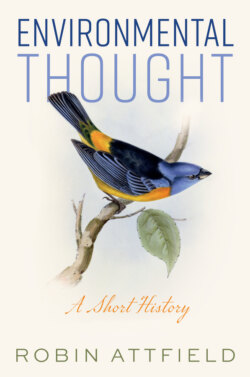Читать книгу Environmental Thought - Robin Attfield - Страница 17
The Old Testament
ОглавлениеIn the course of the thousand years over which the Old Testament was written, beliefs about God, humanity and nature underwent change and development. Different documents from different periods have often been spliced together, such as the two creation narratives in the early chapters of Genesis. Hence, total consistency cannot be expected. Yet central overall themes can be elicited, and were among those widely taught when first Judaism and then Christianity spread across the Roman world and beyond.
One of these themes is the creation by God both of humanity and of the rest of the universe. Everything in creation is continually dependent on God, and nothing but God is to be worshipped. The world of nature consists of his or her creatures, and has its own value as such; yet to worship creatures rather than the creator is idolatrous. These themes are prominent both in Genesis and also in part of the book of Isaiah (chapters 40–55) composed in the sixth century BCE, after the exile in Babylon.
They also appear in the book of Job, which challenges Job to describe and explain the creatures of land, sea and air, and makes it clear that they all have their appointed places, and that God cares for them as well as for humanity (see Job 38–41.) A similar message about God’s care for wild creatures is expressed in the book of Psalms (particularly Psalm 104); psalms were regularly sung in at least the period of the last five centuries BCE.
Relatedly, the Psalms recognize God’s presence in the world; thus Psalm 139 conveys the impossibility of escaping God’s presence. This theme re-emerges in the New Testament, in Paul’s speech in Athens, where he speaks of God ‘in whom we live and move and have our being’ (Acts 17:28).
Another theme is that, despite human sinfulness, God has given dominion over the creatures of the Earth to humanity (Genesis 1; see also Psalm 8. The precise meaning of ‘radah’, the Hebrew term for ‘have dominion’, is debated.). This theme may be a retrospective validation of the domestication of farm animals, but it also authorizes humanity to kill animals for food. In Genesis, humans are represented as originally vegetarian, but as receiving a covenant after the flood, allowing them to eat meat (Genesis 8–9). However, dominion does not involve treating other living creatures as having no value of their own, and can reasonably be interpreted as involving the kind of stewardship foreshadowed in the story of God placing Adam in the garden of Eden to ‘dress it and to keep it’ (Genesis 2:15). Stewardship is certainly the interpretation of dominion in the Bible as a whole adopted by Clarence J. Glacken (1967: 152, 155, 168). (Glacken (1909–89) was the author of a magisterial history of the relations of nature and culture from earliest times to the end of the eighteenth century; in Chapter 3, some of his subsequent writings about the nineteenth century will also be introduced.) Coates (1998: 50) suggests that the stewardship tradition may be ‘enlightened despotism’ (on the part of humanity), but this hardly tallies with the passages that he cites, such as the instruction in Deuteronomy 22 to spare the mother bird when taking eggs from her nest, or ones that he omits, such as the teaching of Proverbs 12 that ‘the righteous man regardeth the life of his beast’, and the opening of Psalm 24: ‘The Earth is the Lord’s, and the fulness thereof’ (consciously echoed in I Corinthians 10:26 in the New Testament), which implies that humanity does not own the Earth, but is answerable to its creator.
The Old Testament also re-emphasizes the goodness of creation, not only in Genesis 1:31, but also in Song of Solomon 2, with its celebration of spring, and in Proverbs 8:22–31, where the wisdom of God is represented as God’s agent in creation, ‘rejoicing before him always, rejoicing in his inhabited world and in the sons of men’. This theme is developed in the intertestamental book, Wisdom of Solomon, which stresses that God is well satisfied with his creation (1:13–16). Elsewhere in the Old Testament, and not least in the writings of the prophets (see Isaiah 55), the fertility of the land is standardly treated as a token of divine favour, while the rivers ‘clap their hands’ and ‘the hills sing together for joy’ in praise of God (Psalm 98). (This theme of nature praising God was taken up later by St Francis; see the later part of this chapter.)
Glacken often writes of God in Judaeo-Christian theology as not being immanent in the world. In the Bible, God is certainly the world’s transcendent creator, but, despite Glacken’s comment, God is often represented as also omnipresent. Psalm 139, for example, expresses the impossibility of escaping from God’s presence, while, in the New Testament, Paul, speaking at Athens, proclaims that, in God, ‘we live and move and have our being’ (Acts 17:28). Thus, in the Bible as a whole, God is both the world’s transcendent creator and immanent in the world as well. This combination of beliefs has proved important for subsequent attitudes to the Earth and its multiple inhabitants.
